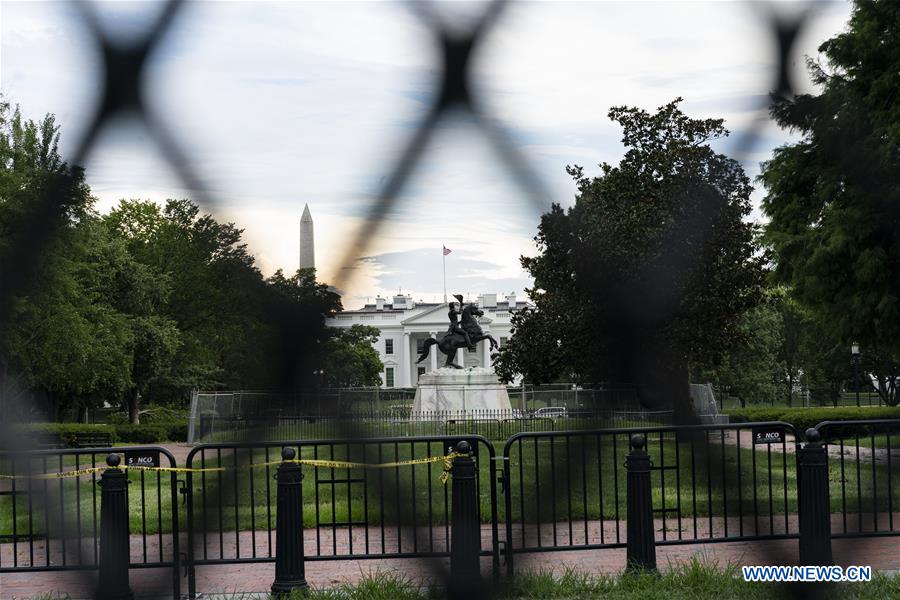US COVID-19 cases surpass 4 mln as Trump pushes to reopen schools
Source: Xinhua Published: 2020/7/24 12:43:35

Photo taken on July 23, 2020 shows the White House in Washington D.C., the United States. The number of COVID-19 cases in the United States surpassed the 4 million mark Thursday to reach 4,005,414 as of 3:04 p.m. local time (1904 GMT), according to the Center for Systems Science and Engineering (CSSE) at Johns Hopkins University. (Xinhua/Liu Jie)
US COVID-19 cases passed the 4 million mark with more than 140,000 deaths on Thursday as President Donald Trump pushes to reopen schools in the fall.
The coronavirus cases in the country reached 4,005,414 as of 3:04 p.m. local time (1904 GMT) on Thursday, and the national death toll from the disease rose to 143,820, according to a tally by Johns Hopkins University (JHU).
California has recently surpassed New York to be the hardest-hit state with 421,857 cases, the data showed. Other states with over 100,000 cases include New York, Florida, Texas, New Jersey, Illinois, Georgia, Arizona, Massachusetts, Pennsylvania, North Carolina and Louisiana.
The mind-boggling milestone came only 15 days after the United States hit the 3 million mark on July 8, according to JHU figures. It took the country nearly 100 days to count its first 1 million cases, from Jan. 21 to April 28.
"The country's rising daily rate of confirmed coronavirus cases, along with a near-record number of hospitalizations, signals the U.S. is far from containing a virus that is straining hospitals and labs," said a CNN report citing health experts on Thursday.
The true number of COVID-19 cases in the United States may be 6 to 24 times higher than reported, according to a new study published Tuesday.
In the cross-sectional study of 16,025 residual clinical specimens, the U.S. Centers for Disease Control and Prevention (CDC) estimated the proportion of persons with detectable SARS-CoV-2 antibodies ranged from 1 percent in the San Francisco Bay area to 6.9 percent in New York City.
Trump on Thursday urged schools across the country to reopen as long as they can practice good hygiene and social distancing.
The White House is asking Congress to pledge 105 billion U.S. dollars to schools as part of next coronavirus stimulus bill, he said.
Trump and his administration is pressuring schools to reopen in fall, threatening to withhold federal funding from schools that do not comply. Reopening schools is seen a crucial step to restarting the country's economy for his reelection campaign.
Few Americans want to see their local schools reopen for in-person instruction as usual or even with minor adjustments, said a new poll released on Wednesday.
Eight percent of Americans say their local K-12 schools should open for in-person instruction as usual and 14 percent think schools can reopen with minor adjustments, the survey, conducted by The Associated Press-NORC Center for Public Affairs Research, showed.
Over 20 states have paused or partially reversed reopening efforts, raising uncertainty over the prospect of economic recovery.
The number of initial jobless claims in the United States rose to 1.4 million last week amid a resurgence in COVID-19 cases, reversing a weekly decline that has continued for 14 weeks, the Labor Department reported Thursday.
With the latest numbers, a staggering 52.7 million initial jobless claims have been filed over the past 18 weeks, indicating the mounting economic fallout of the COVID-19 pandemic.
Trump administration continued to blame World Health Organization (WHO) and China in a bid to deflect responsibility for the failures of his own administration's response to the outbreak.
Speaking at a routine briefing, WHO Director-General Tedros Adhanom Ghebreyesus said Thursday that U.S. Secretary of State Michael Pompeo's latest comments on the relations between the UN health body and China is "untrue and unacceptable, without any foundation."
The sole focus of the WHO is on saving lives, and that the organization "will not be distracted by these comments, and we don't want the entire international community also to be distracted," he said.
Tedros reiterated that the politicization of the COVID-19 pandemic remains one of the greatest threats, as the virus does not respect borders, ideologies, or political parties.
Posted in: AMERICAS,WORLD FOCUS